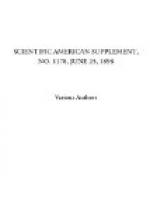In the present war between the United States and Spain, the Queen Regent is an impressive figure, and it is entirely owing to her charm and fortitude that the present dynasty of Spain is maintained. Since his earliest youth she has constantly made efforts to fit her son to wear the crown. The Queen Regent came from the great historic house of Hapsburg, which has done much to shape the destinies of the world. All the fortitude that has distinguished its members is represented in this lady, who is the widow of Alfonzo XII. and the mother of the present king. Her father was the late Archduke Karl Ferdinand and she is the cousin of Emperor Franz Joseph. She has had a sad history. Her husband died before the young king was born, and from the hour of his birth she has watched and cared for the boy. She is the leader in all good works in Spain, and her sympathy for the distressed is proverbial. She gives freely from her private purse wherever there is need, whether it be for the relief of misery or, as recently, when the state is in peril. The young king has been carefully educated. By a curious fate, his birth deposed from the throne his sister Maria de las Mercedes, who as a little girl was queen for a few months. The boy has been brought up under the influence of family life and has a warm affection for his mother and sisters. He has never had the full delights of childhood, for he has been educated in that false, punctilious and thoroughly artificial atmosphere of the court of Spain, in which every care has been taken to fit him for his royal position. His health is far from robust, though the military education he has received has done much to strengthen his constitution. He has been taught to interest himself especially in the naval and military affairs, and the study of the models of ships and military discipline has been one of the principal occupations of his childhood. It is the earnest wish of Spain that he should prove worthy of his mother.
* * * * *
THE MILESTONES OF HUMAN PROGRESS.[1]
[Footnote 1: A lecture
delivered by Prof. Daniel G. Brinton at
the Academy of Natural Sciences,
Philadelphia.]
The subject pertains directly to the advancement of the race. Indeed, it is to the measure of this advancement I shall ask your attention. There is no doubt about the advancement. There are some people who believed and believe that man began in a state of high development and has since then degenerated into his present condition. The belief in some period of Arcadian simplicity and human perfection is still to be found in some remote nooks and crannies of the learned world; but those minds who have been trained in archaeological studies and in ethnographic observations know well that when we go back to the most ancient deposits, in which we find any sign of man at all on the globe, we find also the proofs that




